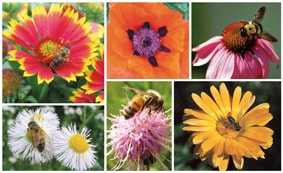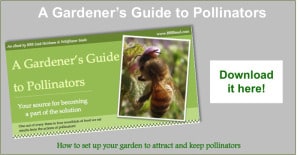Pollinator Conservation
With BBB Seed’s New Bee Rescue Mix
Bees are the most predominant pollinators of flowering plants and they play a vital role in sustaining healthy eco-systems. Loss of natural food supplies and habitat has resulted in the decline of native bees. European Honey bees have also been in decline for a number of years due to Colony Collapse Disorder. As a result, pollinator conservation was made an important part of the 2008 Farm Bill. Which reauthorizes incentives for wildlife habitat conservation practices and provides funding and expertise to assist in maintaining or purchasing easments to conserve or restore native grasslands and to protect agricultural lands from non-agricultural development. All of which help our pollinators.
 It is relatively easy to practice pollinator conservation. For native bees, you can preserve or build bee habit and make it a safe place for the bees. A good bee habitat would include a water source, an area for nesting, and a secure overwintering site that will remain undisturbed. Additionally, you can plant flowers that provide full season nutrition to the bees and other pollinators in your area.
It is relatively easy to practice pollinator conservation. For native bees, you can preserve or build bee habit and make it a safe place for the bees. A good bee habitat would include a water source, an area for nesting, and a secure overwintering site that will remain undisturbed. Additionally, you can plant flowers that provide full season nutrition to the bees and other pollinators in your area.
BBBseed’s new Bee Rescue mixture is composed of annuals and perennials that will bloom all season long. It has been field tested and is known to attract honey bees, bumble bees and other native bees such as mining bees, leaf-cutter bees, sweat bees and long-horned bees. Bees will forage on the flowers for nectar and pollen, which in turn provide the bees their needed carbohydrates and protein. Well nourished bees are more capable of fending off diseases and parasites and are an integral part of sustaining healthy eco-systems.
Pollinator Conservation
Check out these cool, handmade bee boxes from EarthLinks, a wonderful non-profit in Denver dedicated to connecting people-at-risk with earth-at-risk.
Bee-lieve it!
- What is a sweat bee?
Sweat bee is the common name for any bees that are attracted to the salt in human sweat. Formally, the name refers to members of the Halictidae family , a large family of bees that are common in most of the world.
- The U.S. Department of Agriculture estimates that about one-third of the human diet is derived from insect-pollinated plants and that the honey bee is responsible for 80 percent of this pollination.
- How does it work? As bees travel from blossom to blossom in search of nectar, they transfer pollen from plant-to-plant, thus fertilizing the plants and enabling them to bear fruit.
- Honey bees are the only insects that produce a food consumed by humans.
Download Guide to Pollinators E-Book here:

